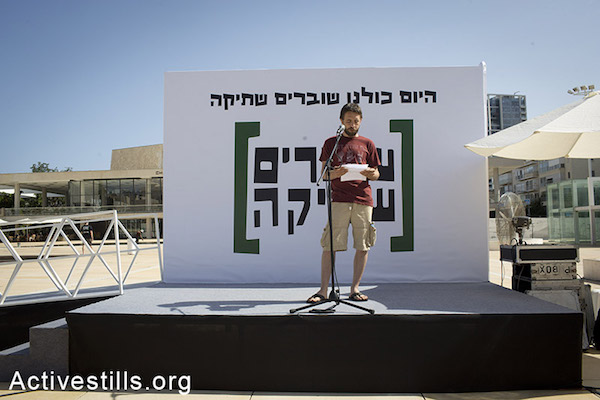The state prosecutor stages a refined production in which it pretends to be the weaker party facing down a massive organization. The state wants Breaking the Silence to reveal the identity of a soldier it suspects of committing crimes during the Gaza war.
By Alma Biblash

An Israeli Magistrate’s Court this week heard a challenge by anti-occupation group Breaking the Silence against a warrant ordering it to reveal the identity of a soldier who provided it with testimony about alleged crimes committed during the 2014 Gaza war.
Breaking the Silence is an organization of former Israeli soldiers that collects, verifies, and publishes first-person testimonies about Israel’s occupation and military control over Palestinians.
In court Sunday the state objected to a request by the Association for Civil Rights in Israel (ACRI) to join as amicus curiae, arguing that prosecution was unfamiliar with its legal opinion and needed to prepare. In the meantime the court delayed making a decision, yet allowed Attorney Michael Sfard, who is representing Breaking the Silence, to reference ACRI’s legal brief in court.
Sfard argued that Breaking the Silence is not only a human rights organization, but also a journalistic initiative, and that removing its journalistic immunity would harm the public interest — far more than any delay in a criminal investigation into the former soldier or even closing that probe. The judge gave the state until July 18 to submit its response.
The feeble state
During the hearing, the state put on a refined production of what the prosecution has turned into an art form: two attorneys representing the prosecution, women, young lawyers without much experience, sent to face Atty. Michael Sfard — a sharp, veteran litigator backed up by a courtroom packed with around 50 Breaking the Silence supporters. Not a single person came to support the prosecution, save for a spokesperson for far-right-wing group “Im Tirtzu.”
The state attorneys asked to delay the hearing. In response to most of the judge’s questions they responded that they did not know, were not sure, or claimed to not have the authority to answer. Only a small portion of their arguments and objections were even defensive: “it is hurtful when they say the prosecution is affected by political influences and the public atmosphere,” and, “it’s insulting and not nice when they laugh.” The latter came in response to laughter among the crowd after Atty. Sfard brought up the state’s motivations in the case. (The quotes are from memory and may not be exact.)
The optical illusion that was created in the courtroom made it seem as if Breaking the Silence was a powerful, experienced, and publicly supported organization, facing down a feeble, lonely State of Israel that is just trying to survive with whatever means it has.
Reality is the exact opposite. When the state places these attorneys in impossible situations it helps sell the illusion that Breaking the Silence isn’t a small organization being persecuted by the establishment — from the lowest levels until top levels of government including the prime minister — and as if 50 supporters are representative of the Israeli public at large. It is trying to give the impressing that the state is only interested in exposing criminals and putting them on trial, and there is nothing but the heartless members of Breaking the Silence standing in its way.
It is hard for me to believe that anyone who believes this is the state’s honest attempt at getting to the bottom of the most violent episodes of the Gaza war, as opposed to yet another attempt to put an end to Breaking the Silence, which continues to effectively expose the horrifying significance of the occupation of the West Bank and Gaza.
Then comes the most moral army in the world. On the face of it, the state’s stated desire to investigate cases of alleged crimes by security forces is praiseworthy. But let’s admit the truth: those who called for dropping bombs on entire neighborhoods in Gaza, which led to the deaths of hundreds of children, are seeking to clear the IDF of any immorality by putting a lowly soldier on trial?
Alma Biblash is a feminist and human rights activist based in Jaffa and blogger on +972′s Hebrew-language sister site, Local Call, where a version of this article was first published.

